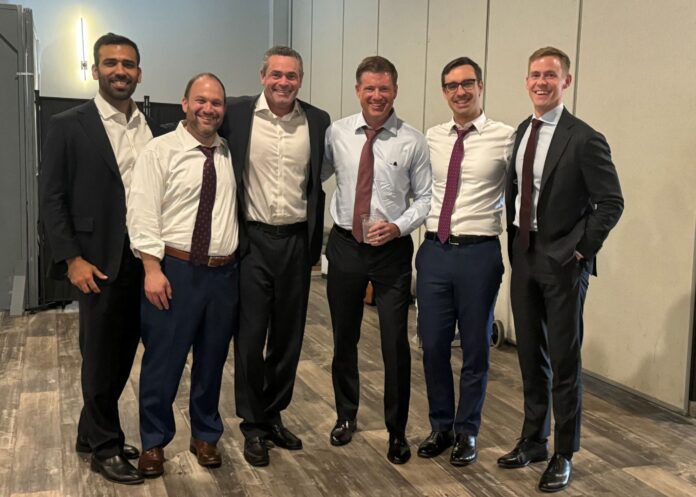
On June 28, a jury in Marshall, Texas, ordered telecommunications company Verizon to pay General Access Solutions $847 million for the infringement of two patents.
The two patents in question in the case, General Access Solutions, Ltd. v. Verizon Communications, Inc. et al, were U.S. patents 7,230,931 and 9,426,794.
The patents are both related to wireless technology, and they were originally filed in 2001. For Verizon’s infringement of U.S. patent 7,230,931, the jury awarded damages of $583 million and $264 million for the infringement of U.S. patent 9,426,794.
The suit was filed in October 2022 in the U.S. District Court for the Eastern District of Texas and heard by Chief District Judge Rodney Gilstrap.
Giovanni Sanchez, a Denver associate at Bartlit Beck who was on the trial team for the case, told Law Week via email that the firm has represented General Access since 2021. He said the firm was brought in for an infringement case against Sprint, which was settled favorably. Sanchez joined the team last fall.
Going into the case, Sanchez said the team was confident about the facts and law, but knew the trial would be a difficult battle. He also emphasized that the success in this case was a team effort, with his role primarily focused on being the master of the technical case.
The disparity in size between the legal teams was significant, with Sanchez describing the opposing legal team as triple their size, counting two firms and over a dozen attorneys lined up against them.
Sanchez noted that the trial started quickly, with his colleague Glen Summers, a partner at Bartlit Beck, providing the opening statement for General Access that established the key technical point that the Bartlit Beck team wanted the jury to focus on.
“Focusing on the technical merits of the case was a tactical choice that would pay dividends throughout the case, but it was by no means an obvious one,” said Sanchez. “Most trial teams in the district introduce only higher-level themes in the half hour allotted for opening statements. But Mr. Summers wisely chose to focus on substance and trust the jury to track the key technical points throughout trial.”
But despite the strong opening statement, the end of the first day ended up as a stalemate, according to Sanchez.
“After opening statements, our inventor testified, and he introduced the jury to the work he and his team had done to bring the key technology to life,” said Sanchez. “While the direct was effective, the defendants were able to score several points due to some difficult admissions the inventor had made during his deposition.”
On day two, Sanchez felt that the Bartlit Beck team had pulled slightly ahead.
“We put on the core of our case, with the testimony of our technical expert, Dr. [Vijay] Madisetti. My colleague, Nosson Knobloch, put on an excellent direct examination that proved infringement on both patents,” said Sanchez. “The key was taking complex technical evidence and distilling it to bite-sized modules along with effective graphics that allowed the jury to slowly digest an extremely complex technical case.”
This was followed by their corporate representative, who the defendants sought to portray in a negative light. But Sanchez said that the team’s local counsel, Andrea Fair, a partner at Ward, Smith & Hill, PLLC, was able to refocus the jury on their narrative.
The difficulty escalated on day three, which Sanchez described as the most challenging one for the team. After General Access’s damages expert testified, the defense launched its case.
“The defense team put on several polished corporate witnesses. On cross, we obtained some key technical admissions, but we had little time to do more in-depth and probing examinations,” said Sanchez. “The day finished with the direct examination of the defendants’ technical expert, who passionately argued that there was no infringement, and that the patents were invalid. At the end of his examination, we had only 88 minutes left of trial time.”
With only two days left in the trial, John Hughes, a partner at Bartlit Beck, cross-examined Verizon’s technical expert.
“He was deftly able to show that the expert was biased and that several of his arguments rested on faulty premises,” said Sanchez. “For example, we were able to demonstrate that the expert had improperly overlooked (or not been informed of) the meaning of a key disputed term which impacted his infringement analysis.”
Following that, the case progressed to the General Access team’s rebuttal, with Madisetti taking the stand once again. By the end of day four, Sanchez told Law Week that the team felt much more confident.
The team’s 40-minute closing argument was divided between Knobloch and Fair.
“Mr. Knobloch presented the technological case in a very jury-understandable way and walked through the evidence the jury needed to come to a verdict for General Access,” said Sanchez. “Then Ms. Fair stuck the landing — our team had predicted all the key themes the defendants would try to advance, and she methodically deconstructed them all.”
With the verdict returned in their favor, Sanchez said the team felt both satisfied that the time and effort had paid off and grateful that the jury followed the evidence to come to its conclusion.
“We are deeply gratified by the jury’s verdict, which recognizes the fundamental contribution made by our client’s technology to 5G and other broadband communication systems,” said Sanchez. “The Bartlit Beck team is also proud to have secured one of the largest patent infringement verdicts ever”
But this verdict may not be the end of this case. Sanchez told Law Week that the defendants have signaled that they intend to challenge the verdict, and they also had three equitable defenses tried just a few weeks after the jury trial.
He and Summers have since presented arguments on behalf of General Access, and both sides are now awaiting the rulings.
“In short, we expect ongoing litigation in multiple venues before the litigation is concluded,” said Sanchez.

